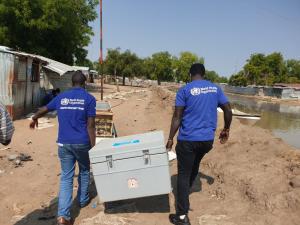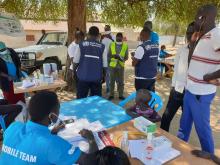Rainy season increases cholera threat in South Sudan
Juba—The ongoing rainy season in South Sudan is slowing cholera response efforts in some locations, raising concerns about further transmission and undermining progress the country has made so far in combating the outbreak.
South Sudan experiences heavy rainfall between mid-July and October. The States of Jonglei, Unity, Upper Nile, Northern Bhar el Ghazal, Warrap, parts of Central Equatoria, and others experience seasonal flooding, resulting in massive displacement, and affecting the delivery of basic health services. The rainy season worsens access and sanitation, disrupts the shipment of medical supplies, hinders deployment of rapid response teams, and vaccination impedes efforts, making it difficult to protect communities and save lives.
The country declared a cholera outbreak in October 2024, since then, the Ministry of Health with support from World Health Organization (WHO) and other partners, has mounted a comprehensive response, including deployment of rapid response teams, prepositioning medical supplies and coordination efforts across all levels to protect communities and safe lives. This is the longest cholera outbreak in the country’s history, since independent in September 2011.
As of 30 June 2025, South Sudan has reported a cumulative total of 77 555 suspected cases and 1 401 deaths these cases have been reported from 55 counties, across 9 States and all 3 Administrative areas. A cumulative total of 11 554 tested positive using the rapid diagnostic test kits (RDT), and an additional 424 cases had laboratory isolation of Vibrio Cholera.
In response, the country has successfully conducted an oral cholera vaccination campaign, reaching over 6.9 million people in 40 Counties. affected counties, these campaigns have significantly slowed the spread of the outbreak and is estimated to have saved hundreds of lives with a total of 19,987 deaths averted.
To support vaccination efforts, South Sudan secured over 8.7 million doses of oral cholera vaccines from the International Coordination Group (ICG) to protect communities, and deployment. the country has applied for additional doses.
WHO has played a critical role by training over 2000 health workers and community members on various aspects of the response including case management, risk communication and community engagement, IPC/WASH, vaccination and surveillance. The organization has also supported establishment of 102 oral rehydration points (ORPs), 88 cholera treatment units. (CTUs) and 19 cholera treatment centers (CTCs) through implementing partners, which have significantly reduced fatalities. Over 175 Metric Tons of medical supplies have been distributed across the affected Counties. Additionally, WHO has conducted extensive water quality testing and provided treatment to the affected communities.
Several factors have contributed to the outbreak, including high population density, population movement, limited access to water and sanitation facilities, open defecation, and poor hygiene practices, created a highly vulnerable situation that led to imported cases and local transmission.
Mr Kereni Gong, Acting Director General, Unity State Ministry of Health highlighted the urgent need for interventions in response to the ongoing flooding, emphasizing the importance of immediate action to save lives of the flooding and call for urgent interventions to save lives
‘Unity state is the epicentre of the current cholera outbreak. With support from WHO and other partners The State Ministry of Health managed to bring down the number of cases, but we need more support as we enter the rainy season, during which cases have already begun to rise. We are also aware that floods are coming from the southern part of Unity State which will further worsen the situation” he said
Dr Humphrey Karamagi, WHO Representative in South Sudan, underscored the gravity of the situation and express gratitude on the effectiveness of the ongoing cholera response efforts: “The scale of the current outbreak is unprecedented, the onset of the rainy season poses significant challenge in addition to the prevailing humanitarian crises” said Dr Karamagi “Under the leadership of the Ministry of Health we have been able to protect the communities by mounting effective response including vaccinating over 7 million people, now Is the time to up our game in strengthening case management, surveillance and coordination to save lives.”
Additional funding is required to contain the outbreak, as the rainfall poses the risk of transmission., WHO requires additional funding to bolster current operations by deploying swift response teams to newly identified hotspots, maintaining essential health services for affected communities, and procuring, shipping, and distributing more emergency supplies to support the ongoing response.

